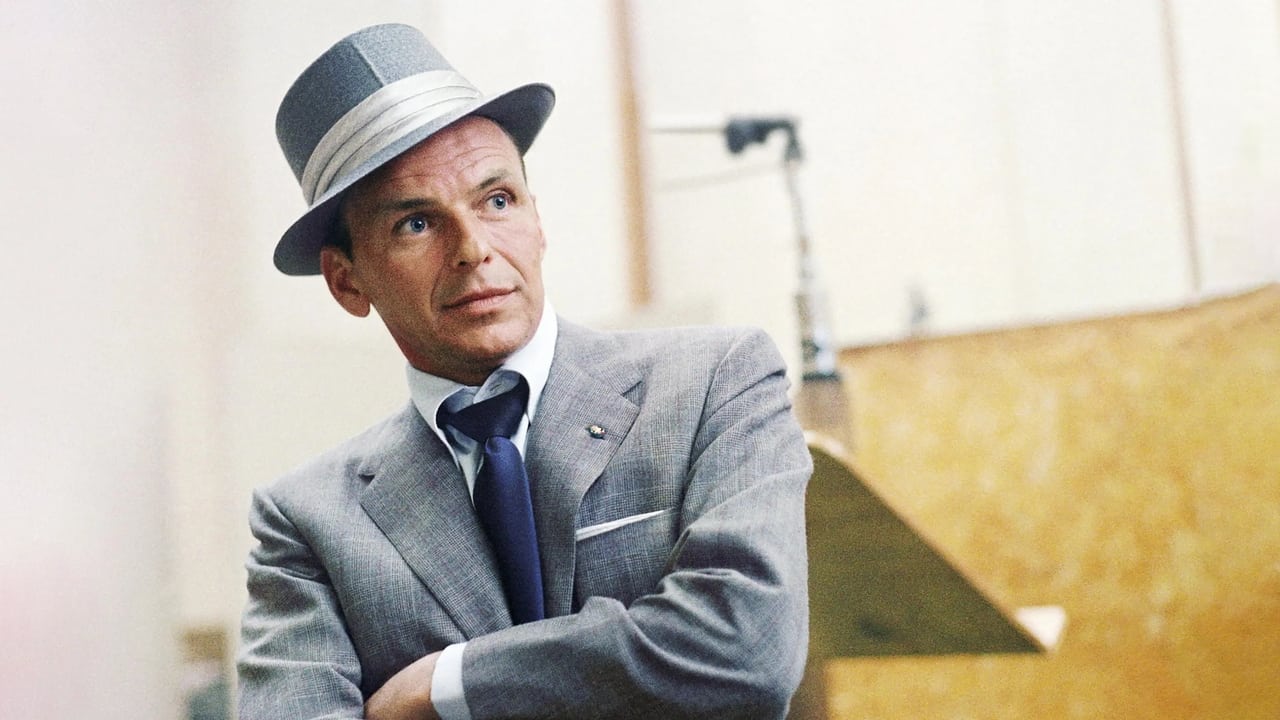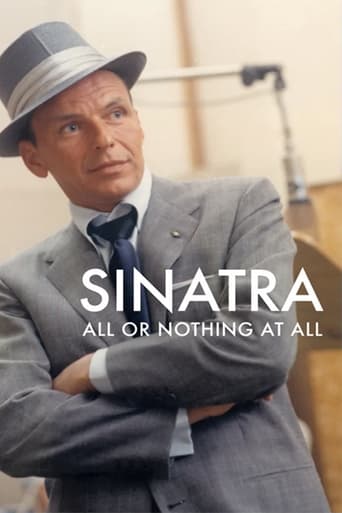

SERIOUSLY. This is what the crap Hollywood still puts out?
... View MoreDreadfully Boring
... View MoreThe best films of this genre always show a path and provide a takeaway for being a better person.
... View MoreIt really made me laugh, but for some moments I was tearing up because I could relate so much.
... View MoreSinatra: All or Nothing at All (2015) **** (out of 4)Highly ambitious documentary that takes a look at the rise of Frank Sinatra from his way out of New Jersey to the rise in the charts and eventually conqurering Hollywood, Las Vegas and anything else that he wanted to.Not too many people could have their life story take up four hours but that's exactly what we get here with SINATRA: ALL OR NOTHING AT ALL, which is certainly the perfect title for this. The documentary covers the life of Sinatra as we get to hear his story in his own words. Hours and hours worth of interview footage was used to come up with the story structure here, which is also done according to the eleven songs that the singer would do at his 1971 retirement concert.There's no question that this is a highly entertaining documentary that works on many levels. The greatest thing about it is that there are some terrific video footage of various concerts, radio specials, television specials and other items. There's no doubt that a lot of this footage hasn't been seen before and that's the greatest thing this documentary offers. Plus, you've also got the interview footage with Sinatra, which is great fun and especially since it is used to tell his own story.Several others are also interviewed and we get to hear their voices including Sinatra's children, his first wife and even Mia Farrow. The various high points of his life are discussed including him breaking onto the radio, taking Hollywood by storm and winning an Oscar, his continued rise on the music charts, his various women, The Rat Pack and his connection to JFK. His mob association is also discussed throughout the four hours.I will say that there were some problems with the film including the fact that the last twenty-five plus years of his life are discussed during an "encore" that only lasts around ten or so minutes. It's really too bad they just didn't extend the running time to take a look at his later years since it's doubtful another documentary is going to come along like this one. I'd also argue that the documentary took it rarther light on Sinatra and really didn't dig into any of the darker stuff around him.With all of that said, at four hours the film really does seem to be too short, which says a lot about the film as well as the man himself.
... View MoreSINATRA - ALL OR NOTHING AT ALL cannot be viewed as anything less than a highly comprehensive biography of the legendary actor/singer. Through four hour-long episodes, director Alex Gibney traces his life from his humble origins in Hoboken, New Jersey, to his radio and film stardom, his abrupt decline in the early Fifties, and his return to enduring stardom once he had signed for Capitol Records and started collaborating with the conductor Nelson Riddle.Although liberally illustrated with reminiscences from members of his family, coupled with archive recordings of "Ol' Blue Eyes" being interviewed on television on radio, and readings of printed autobiographies by Ava Gardner, there are no talking heads appearing on screen. Instead, director Gibney uses archive footage, photographs and specially-shot material, with the reminiscences in sound only. This gives the documentary a unique narrative fluidity that Gibney sustains throughout the lengthy running-time.The central conceit was a good one - using Sinatra's retirement concert in 1971 as a basis, where he sang a series of standards that chronicled his life up to then - Gibney traced the singer's life through the songs. Each one of them were heard once a particular period of his life had concluded. Hence we heard "My Way" right at he end when Sinatra had decided to "finally" retire, having ostensibly fulfilled everything he wanted. The fact that he made a comeback three years later was beside the point.Yet still we are left unsatisfied as to where the director's point of view actually lies. There are certain aspects of Sinatra's life that are either sketchily told or omitted altogether; we hear nothing of his nefarious antics in the early Sixties where JFK and Marilyn Monroe were concerned. Nor do we really discover much about his Mafia connections, except to learn that he enjoyed hob-nobbing with those in power. At one point the documentary refers to his ventures as an entrepreneur, as he founded his own airline (among other things), but that strand is subsequently ignored. We do not know how successful the singer was as a business person.Although the program justifiably makes much of Sinatra's god-given talent as a singer, he nonetheless comes across as a distinctly unsavory personality. He treated two of his four wives extremely badly - only Ava Gardner could really stand up to him; and he seems to have assumed that any woman he encountered would want to go to bed with him. An inveterate social climber, he spent much time and energy helping JFK win his presidential campaign of 1960; but when the Kennedys dropped him - on account of his connections with Mafia boss Sam Giancana - Sinatra transferred his loyalties to the Republican cause. In later life he came out as a supporter of Nixon and Reagan. He obviously did not like to be crossed; there were several instances of him replying to someone with a mouthful of abuse.The interviewees worked hard to foreground his qualities - his enduring commitment to the cause of anti-racism, his generosity with underprivileged children - but we still got the sense that he was not undertaking them out of altruism. So long as he obtained a good press as a result, then he was prepared to continue. Perhaps it's best sometimes that we do not know the intimate details of an icon's personality, as it tends to knock them down from the imaginative pedestal on which we place them.
... View MoreThe big question about this tele-biography was whether it would be a balanced overview of Frank Sinatra and his career, or just a fawning snow job.Now in me, you have a person who has, I think, a somewhat balanced view of Sinatra. I neither love nor hate him. I have all of his Reprise studio recordings and many of his Capitol albums the good, the bad, and the ugly. And make no mistake, for a while in the early Reprise years many of Sinatra's recordings are probably the best versions of those songs – both in terms of his vocals and the arrangements – ever recorded. His concept albums for Capitol were groundbreaking. On the other hand, during the Reprise years you have recordings such as "Everybody's Twistin'" and "Life's A Trippy Thing". And, since Frank was totally in control during the Reprise years, there was no one else to blame. I look at his performance in "The Joker's Wild" and can't think of many actors who have ever turned in a better performance. And then there were some of the later films when he just didn't seem to care much. He was a flop on early television, but his 1960s specials were "cherce". So, I can admire much of what Frank Sinatra accomplished. He made a difference in popular music. But when it comes to the kind of man he was, well...my 100th birthday gift is to not finish that sentence.Some of what is said in the program doesn't seem to match with accounts which have been presented in the past. For example, in talking about the Capitol years they indicate Sinatra was in total control. Really? Then why quit Capitol to form Reprise, which at the time he said gave him artistic freedom? Where is the story of "dropping" Peter Lawford for the Kennedy incident? Dropping Joey Bishop? Having a long-term falling out with Dean Martin? Oh, conveniently omitted. The whole mob issue is brought up, but sort of dismissed as the mob did it and the Kennedy's did it, but Sinatra and his friends did everything out of the goodness of their hearts. And, in my view, far too much credit is given to Sinatra and friends for the election of John Kennedy.I didn't have high hopes for this television broadcast when I learned that it was produced by Frank Sinatra Enterprises. Much of the story here is told by Frank himself (in old interviews) and Nancy Sinatra and Frank Jr. After all, Frank thought he was wonderful, Nancy always fawned over her father, and, while Frank Jr. is a bit more balanced, it's almost always pretty positive. Even when the criticism during the war years is brought up (for example), it's within the context of how unfair some people were being to Sinatra. So, make no mistake, this is no penetrating, balanced biography. It should have been entitled "A Love Letter To Frank Sinatra".That's not to say it doesn't have something worthwhile of your time. You'll see film here you will probably never see again. It's comprehensive, if not objective. It's almost as if Sinatra was the only singer, the only actor, the only nightclub performer. He was big, but he was not alone. There was Cole, Crosby, Como, and many more. Frankly, the program couldn't have been more positive toward Sinatra if Sinatra had written it himself.Well, happy birthday, Mr. Sinatra. Your bio reminded me of all the reasons I admired so much of your work...and some of the reasons I didn't really like you as a person. I guess that's a very special way of appreciating you -- it's not easy to dislike someone personally, but buy almost all of their albums, watch all of their television specials, and go see most of their movies. Yup, you were very a very talented man.
... View MoreExpansive, lengthy, epic documentary of Frank Sinatra is an obvious loving if at times honest (in a way that doesn't dismiss or demean him) portrait of an iconic music and cultural celebrity. His affair with Ava Gardner while married with children, his relationship with the mob, his Rat Pack era, coming up against ups and downs in the music industry, fight to get cast in To Here from Eternity and the subsequent success because of it (I wish "Some Came Calling" had gotten some love, though), his relationship with JFK, his being accused of supporting communism, his antagonistic relationship with the scathing press, his romance with the much younger Mia Farrow, dealing with the changing times of the mid-to-late 60s and early 70s, declining music sales towards the beginning and certainly the end of his music career, the retirement and return from retirement, and his vocal support of civil rights (although his and Dean Martin's treatment of Sammy Davis, Jr. as a buffoon and/or object of comedy with racist jokes is critically held accountable by Harry Belafonte) are all covered. Various figures in his life (and admirers) add narrative voice to the images of Sinatra's life and career. If you are a fan or just interested in the life of Sinatra, then this documentary, All or Nothing at All, could very well be exactly what the doctor ordered. Performances and use of his songs/music are a constant so if you are not one of those who enjoys his vocal arrangements and crooning, then this is definitely something you might want to avoid. But if you are curious about the life and career of Ole Blue Eyes, this documentary will teach you aplenty.
... View More